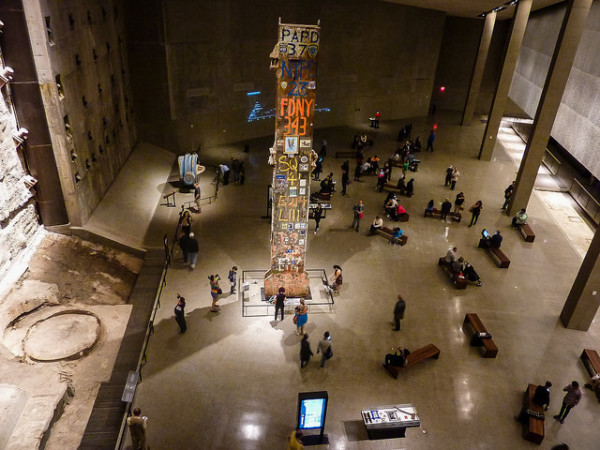
By Matt Waters
At the 9/11 Museum, I had trouble leaving when it was time to go. It was like I didn’t want to walk away from the reality of the memory. Maybe it was because I was thirteen when it happened. In my mind, the day is behind a gate, and a part of me remains inside, solitarily overseeing the grounds. The gate is not locked, and thieves are welcome. It’s not that their explanations help. The explanations are just a reasonable price for the broken silence.
There was this realization that someone out there will probably hate you no matter what you do, or who you are, and doesn’t that make humans feel bacterial?
There was a woman’s purse underneath a glass case, and the change she carried around to give to the homeless. There were the wedding invitations that were found in the rubble. There was a hunk of the satellite from atop the North Tower. There were photographs from a photographer who dug through the debris. Volunteering, probably wearing one of those paper masks fastened by a thin string. There were thoughts I was having. Thoughts about identity, like the interrogator had crossed the moat and it was time to decide who I was and why, without apology. I was staring at the satellite and thought, “this is the world I invest in, the world of art and entertainment and communication.” There was this realization that someone out there will probably hate you no matter what you do, or who you are, and doesn’t that make humans feel bacterial? And yet there was love everywhere. Love on the walls in a remembrance room, portraits of people lost. There was a portrait of a man with his chest exposed, looking like he just took a picture of himself in the bathroom after a shower. I wondered if his friends had picked that picture for a reason. To say, this is who he was. It was like a ‘fuck you’ to everything. He might be gone, but he enjoyed his life like no other. And that means more than anything. That’s what it said to me, anyway. There was this song being born in my head, something about being a part of a generation, and us being children of this disaster, children of this disaster and the following televised disasters, the televised violence. What’s it mean? I don’t know. There were voicemails from people in the planes, in the towers. Voicemails that started with a robotic voice saying, “From. September Eleventh. AT Nine. Fifty. Nine. AM.” The sign that said there were remains behind the wall. The blue squares on the wall, over two thousand different shades of blue, the color of the sky.
We had a moment of detective work, children considering who was responsible, throwing darts at countries half-remembered from hearing the television in our parents’ room.
I remember everything I did that day. I remember that I left school early and was home by myself reading that day’s newspaper. Like reality was drowning me and the ink was a life raft, the bold ink. I watched a man on the television screaming at people because they were collecting dust from the street in cups. He was screaming we’re at war, don’t you understand? And I believed him, but I also was reading the TV Guide in case I’d look up from the TV Guide and everything would be a dream. An article about Mike Binder’s show ‘The Mind of a Married Man.’ Thinking one day I’ll be a married man and not feel so scared. The movement of my eyes, from page to screen, did calm me down, did make me feel like this was something that could be handled, something that could be understood. But you don’t understand. You end up drunk with your friends, the conversation revisited through the years, about how none of you understood, our confusion a thread. No matter where we ended up that day, me in the living room, my friends at the park, we had a moment of detective work, children considering who was responsible, throwing darts at countries half-remembered from hearing the television in our parents’ room, or movie plots from the dark theaters, the safe dark theaters. Instead of understanding all these years later, it’s still just the TV Guide and an article about a show that unfolds behind the screen, the columnist’s face above her byline, the columnist smiling. We’re at war, don’t you understand? The weeks after, the battalions of fire trucks roaring down our streets heading for Manhattan, the smoke pouring through our classroom window, and hissing, sizzling while it rose to our ceiling, white vaporous smoke, death smoke, and the teacher saying it was time to pray.
At the museum, when I couldn’t leave, I thought this was ours, and doesn’t that matter? But I don’t want to be a part of history. I don’t want to acknowledge that we shared something horrible together. So I place faith in the explainers. Tell me the role I played, and I’ll be the actor reading the right lines. It doesn’t work, though. Even if you wish those moments were never experienced, they do become your property. The city property, the personal property, the bacteria and love, I walked out of there feeling like I was in the future, and how did it happen? The air is changing, winter is dying, the traffic is moving, I am moving, walking away from the 9/11 Museum, crossing the street, looking back at our life.

